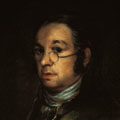








The general aim of historical painters, says Mr. Ireland, has been to emblazon some signal exploit of an exalted and distinguished character. To go through a series of actions, and conduct their hero from the cradle to the grave, to give a history upon canvass, and tell a story with the pencil, few of them attempted. Mr. Hogarth saw, with the intuitive eye of genius, that one path to the Temple of Fame was yet untrodden: he took Nature for his guide, and gained the summit. He was the painter of Nature; for he gave, not merely the ground-plan of the countenance, but marked the features with every impulse of the mind. He may be denominated the biographical dramatist of domestic life. Leaving those heroic monarchs who have blazed through their day, with the destructive brilliancy of a comet, to their adulatory historians, he, like Lillo, has taken his scenes from humble life, and rendered them a source of entertainment, instruction, and morality.
This series of prints gives the history of a Prostitute. The story commences with her arrival in London, where, initiated in the school of profligacy, she experiences the miseries consequent to her situation, and dies in the morning of life. Her variety of wretchedness, forms such a picture of the way in which vice rewards her votaries, as ought to warn the young and inexperienced from entering this path of infamy.
The first scene of this domestic tragedy is laid at the Bell Inn, in Wood-street, and the heroine may possibly be daughter to the poor old clergyman who is reading the direction of a letter close to the York waggon, from which vehicle she has just alighted. In attire—neat, plain, unadorned; in demeanor—artless, modest, diffident: in the bloom of youth, and more distinguished by native innocence than elegant symmetry; her conscious blush, and downcast eyes, attract the attention of a female fiend, who panders to the vices of the opulent and libidinous. Coming out of the door of the inn, we discover two men, one of whom is eagerly gloating on the devoted victim. This is a portrait, and said to be a strong resemblance of Colonel Francis Chartres.
The old procuress, immediately after the girl's alighting from the waggon, addresses her with the familiarity of a friend, rather than the reserve of one who is to be her mistress.
Had her father been versed in even the first rudiments of physiognomy, he would have prevented her engaging with one of so decided an aspect: for this also is the portrait of a woman infamous in her day: but he, good, easy man, unsuspicious as Fielding's parson Adams, is wholly engrossed in the contemplation of a superscription to a letter, addressed to the bishop of the diocese. So important an object prevents his attending to his daughter, or regarding the devastation occasioned by his gaunt and hungry Rozinante having snatched at the straw that packs up some earthenware, and produced
From the inn she is taken to the house of the procuress, divested of her home-spun garb, dressed in the gayest style of the day; and the tender native hue of her complexion incrusted with paint, and disguised by patches. She is then introduced to Colonel Chartres, and by artful flattery and liberal promises, becomes intoxicated with the dreams of imaginary greatness. A short time convinces her of how light a breath these promises were composed. Deserted by her keeper, and terrified by threats of an immediate arrest for the pompous paraphernalia of prostitution, after being a short time protected by one of the tribe of Levi, she is reduced to the hard necessity of wandering the streets, for that precarious subsistence which flows from the drunken rake, or profligate debauchee. Here her situation is truly pitiable! Chilled by nipping frost and midnight dew, the repentant tear trickling on her heaving bosom, she endeavours to drown reflection in draughts of destructive poison. This, added to the contagious company of women of her own description, vitiates her mind, eradicates the native seeds of virtue, destroys that elegant and fascinating simplicity, which gives additional charms to beauty, and leaves, in its place, art, affectation, and impudence.
Neither the painter of a sublime picture, nor the writer of an heroic poem, should introduce any trivial circumstances that are likely to draw the attention from the principal figures. Such compositions should form one great whole: minute detail will inevitably weaken their effect. But in little stories, which record the domestic incidents of familiar life, these accessary accompaniments, though trifling in themselves, acquire a consequence from their situation; they add to the interest, and realise the scene. In this, as in almost all that were delineated by Mr. Hogarth, we see a close regard paid to things as they then were; by which means his prints become a sort of historical record of the manners of the age.
 THE HARLOT'S PROGRESS.
THE HARLOT'S PROGRESS.